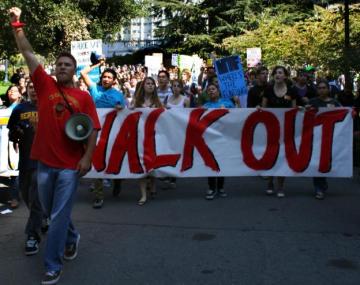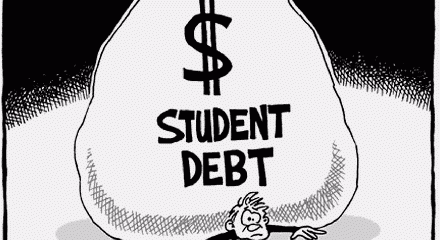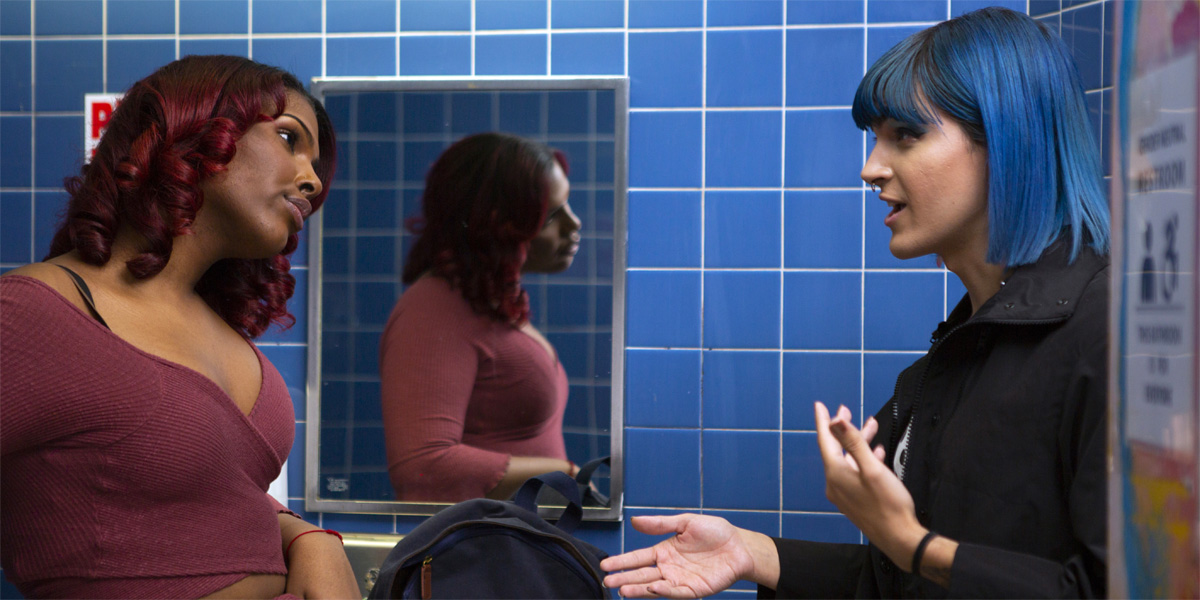Katrina’s Team Pick:
Whether you agree or disagree with Occupy Wall Street, whether you feel disenfranchised or empowered by it, whether you feel passionate or indifferent or anywhere in between, it is impossible to ignore the fact that, despite “The 99%” mantra, OWS is coming disproportionately from a voice of the youth.
Many of the protesters are college students or recent graduates, whose disaffection has been inspired by the simultaneous rising tuition costs and plummeting job opportunities. Higher education today is being perceived as more valuable than ever, while its tangible benefits and advantages are possibly less valuable than ever. President Obama set the lofty goal of attaining the world’s highest graduation rate by the year 2020, but unless he also establishes a plan for making college more affordable – not to mention more accessible – then his goal is also a promise to put more students than ever into debt, a completely horrifying concept for us both as individuals and as a country.
“Default” is a short documentary about the student loan industry and the stories of individuals who have been critically affected by it. And while the trailer maybe not be perfect (an outdated shoutout to the class of 2008, one person of color in the background of one frame), the conversation that it’s trying to have is one that’s worth noting. How do low-income students experience the higher education system differently than students of means? And what does their subsequent debt say about the true possibilities of social mobility in America? It’s a reminder that student debt isn’t just about young people, it’s about their families as well — families that were under the impression that, if they gave it all to give their children an education, that the benefits would come back.
Education, especially higher education, has been painted for us as the best opportunity for advancement and success in our country and in our world. We have come to understand that, without it, there is little room for mobility, and there is little hope for one’s future. If this is true, then the message is clear that hope for one’s future is not for everyone. The future is promised to only a few. Those whose families were better able to fund an education (and those whose families were willing to fund their children’s education at all), most of whom could afford to spend their time at unpaid internships or who could study without having to balance should with one or more part times jobs. The rest of us – low-income, the working, the non-traditional – it seems, are screwed.

The conversation about student debt is a conversation that everyone who’s in school should be having. It should reach beyond the point of acknowledging that our prospects totally suck, and it should recognize that collectively having these problems and feeling this way about our future just isn’t right. It should consider whether or not we have the power to affect change, and it should consider not only what those options might be, but what the result could look like for us if we choose not to take them.
Click here to organize a screening of “Default” near you.









Comments
I went to law school(and grad school and undergrad) so my students loans are pretty high. Pretty freaking high. I’m currently doing IBR(the public interest loan forgiveness program through the federal government) does anyone have thoughts about this particular program?
an overview of ibr – if your loans are consolidated through direct lending and were not originally private loans, you make a payment based on your income AND if you are in qualifying public interest employment for ten years(the equivalent of 120 qualifying payments) your loans are forgiven, without negative income tax consequences.
the problems with ibr as i see them are:
1) the qualifying payments may not even cover interest(mine don’t) so if i am not in public interest work, i’m screwed and having started down this path become more and more potentially screwed as time goes on(the government does pay some of the interest for some of the time though)
2) this is not an option for everyone because there are no jobs.
3) the program would be better if you received yearly forgiveness, rather than requiring the entire ten years.
however, i do think its interesting that there is a program under which the federal government forgives your loans, but i feel like it is rarely mentioned in the discussion of whether the federal government should forgive loans. its not a perfect program, but we should acknowledge it exists.
overly long post. apologies.
i just found out about this yesterday! i had no idea there was such a thing.
I mean, people definitely need to know about it! Solidarity!
In the social work field a lot of times they’ll do partial debt forgiveness if you sign your soul away to DCF/CPS for a while… The need for monetary incentive should tell you how joyous that job prospect it.
Suddenly my $14000 doesn’t seem so bad.
Now! Here’s to finding jobs! (I hope)
Yeah, I had $15k in student debt and I felt like I got away pretty well. I have friends who left school with closer to $200k in debt!
Australian higher ed prices aren’t that great either, but when I tell people over here that I got away lucky with what I did, they’re shocked.
(Also, I’m pretty sure the only reason I have my student loan debt paid off now is that I live in Australia. The job situation here is SO MUCH BETTER.)
thinking about student loans makes me want to hide in the corner. thinking about their forgiveness makes me want to dance.
My grad school loans will be coming due within the next year or so, which I was feeling a little anxious about — but then one night I sat down, added ’em all up, looked at what my full monthly payment would be, and instantly felt much better. Not because it was less than I expected — but because now I know, and can stop vaguely guessing and being afraid. I recommend looking at these things straight on.
Being in school is really my only option. I get a disability check and student loans and that is it. My family isn’t rich enough to help me out. (especially after everything going to shit and them losing a big chunk of what they’d accumulated over years of hard work) Without those student loans I don’t know what I would do, and while I know it’s likely I won’t ever pay them off I already feel disenfranchised enough that I can’t even bring myself to care. I have an awful credit score, have been unemployed for the better part of four years, and pretty much got told to my face that they were firing me from my last job for being blind. (yes I tried to get them in trouble. no, it didn’t go anywhere.) If they want to take blood from this stone whatever. They can squeeze as hard as they want. So I figure at least I can learn something. I love learning and I’ve chosen subjects that have the ability to give back to society. (forensic psychology, Middle Eastern languages) But I think one of the biggest problems is the same problem we have with jails…we can’t decide what we want the institution to do. Are we preparing people to work? To be scholars? Something else? That keeps a lot of students from knowing what they’re there for, too. I was lucky. I knew what I wanted out of undergrad. So many people around me didn’t, and I think they got taken advantage of because they were sold the idea that college was the Thing That Was Done.
My school is actually holding my transcripts until I pay them back. So much for institutional support.
Is that even legal? If it is, it definitely shouldn’t be.
Yes, it’s legal. They don’t do it if you owe the lender, they do it if you owe the school itself – if there are any fees that you haven’t covered either through financial aid or out of pocket money.
I try not to think about my student loans too much, it’s too depressing.
I’m not sure how it works in your countries, but in mine we have no interest on our student loans. The way I figure it, i’m just going to let it sit there (they take a little out of your wage if you earn over a certain amount), and never intend to pay it all back. The reality is, it is all just numbers on a computer or on a piece of paper. Its not really real. I resent paying for over priced education, and have no intention of doing so.
Thanks for the shout out for our film! Glad you’re covering the student debt crisis and OWS!
DEFAULT: The Student Loan Documentary
http://RockTheDebt.org
I fully agree that college and university is overpriced, especially in the US (I’m in Canada). I worked every summer but not during the school year for most of my college/university career and definitely did not budget well and came away with about 25 grand in debt. I regret this debt and wish it was less but will pay it back eventually.
My questions is – who should pay for your education?
I go to a school where tuition alone is $8000 a semester. It is a crime what they are charging us and I have friends who are up to their neck in debt. The government keeps cutting down need grants and work study which is a crime!
Luckily I have been able to stay out of debt, I have no student loans what so ever but that is because I work full time even though I go to school full time. But even I hate this because who has time for sleep when you work 40-50 hrs a week, go to class for 10 hrs a week and then there is homework. Sometimes I wonder if the price for staying out of debt is worth it.
If the American generation internet course https://meiguodaixie.com/wang-ke-dai-shang%203 platform is stable,the technical equipment is in place, then the live course can only be considered qualified,but far from the mature standard.In our view, the mature live course must be able to directly compete with Tik Tok and games.Because “classroom discipline” is uncontrollable for teachers who take live classes, they don’t know if the students at the other end of the screen touch the iPad while listening to the class.Therefore, under the premise of imparting knowledge, live classes must mobilize the enthusiasm and interest of students in many ways, so that students really learn something, which is what mature live classes should do.When it comes to teaching methods that can arouse students ‘ interest, it is actually a great challenge to the content design of the course and the teaching methods of teachers.Abstract: Taking mathematics teaching as an example, it is pointed out that students can start from everyday life, such as the anthropomorphic understanding of parity functions, so that students can really listen to the knowledge with exquisite explanation.
If the American generation internet course https://meiguodaixie.com/wang-ke-dai-shang platform is stable,the technical equipment is in place, then the live course can only be considered qualified,but far from the mature standard.In our view, the mature live course must be able to directly compete with Tik Tok and games.Because “classroom discipline” is uncontrollable for teachers who take live classes, they don’t know if the students at the other end of the screen touch the iPad while listening to the class.Therefore, under the premise of imparting knowledge, live classes must mobilize the enthusiasm and interest of students in many ways, so that students really learn something, which is what mature live classes should do.When it comes to teaching methods that can arouse students ‘ interest, it is actually a great challenge to the content design of the course and the teaching methods of teachers.Abstract: Taking mathematics teaching as an example, it is pointed out that students can start from everyday life, such as the anthropomorphic understanding of parity functions, so that students can really listen to the knowledge with exquisite explanation.
If the American generation internet course https://meiguodaixie.com/wang-ke-dai-shang platform is stable,the technical equipment is in place, then the live course can only be considered qualified,but far from the mature standard.In our view, the mature live course must be able to directly compete with Tik Tok and games.Because “classroom discipline” is uncontrollable for teachers who take live classes, they don’t know if the students at the other end of the screen touch the iPad while listening to the class.Therefore, under the premise of imparting knowledge, live classes must mobilize the enthusiasm and interest of students in many ways, so that students really learn something, which is what mature live classes should do.When it comes to teaching methods that can arouse students ‘ interest, it is actually a great challenge to the content design of the course and the teaching methods of teachers.Abstract: Taking mathematics teaching as an example, it is pointed out that students can start from everyday life, such as the anthropomorphic understanding of parity functions, so that students can really listen to the knowledge with exquisite explanation.
Feel free to give us a call and don’t hesitate to contact your writer if you need urgent delivery – we are known for handling papers of high complexity, within a few days. The academic record you wish you had is not acquired at lightning speed, just like Rome was not built in a day. What we are suggesting is a steady transition to reliable writing partners, able to provide communication on a daily basis. https://www.essayquality.com Choosing the writer of your dream at essayswriting.org, you do not only invest in college homework, but develop your sense of discipline and structure as it takes a while to complete a customized essay paper. Follow the guidelines on our website and have your work done by pros!
Students, who are looking for an assignment help, are often deluded into thinking they can manage an essay paper the night before the test. This is, however, a tough challenge, since you don’t have enough time and want to sleep instead of study. Our customer support team, on the other hand, is always awake – we receive orders seven days a week and are there to help you in case you are confused about the general terms.
EssayService attracts and employs the best and fastest essay writers online.https://www.essayquality.com Every writer in our team is highly educated, experienced, attentive to detail, and dedicated to delivering only quality pieces and always on time. So if you need a professional paper writer, our academic writing service is proud to offer you a selection of the very best.https://lunwen.dueessay.com We are confident that our writers will deliver the best results. When you hire a paper writer, we try to offer as high rates as possible to our writers to create an atmosphere of appreciation and fair reward. We also try to provide you with custom papers at affordable prices to make sure you can afford our essay writing service help.https://www.mingxinwrite.com We take great care of both you, our customer, and writers.
Essay writing service https://www.aplusgpa.net is a kind of writing help that offers you with a custom essay written from scratch by an expert writer. It can be used for any type of assignment, but it is mainly used by people who need their essays done fast and cheap. When you decide to use our services, we will do everything possible to make sure that you get an excellent grade on your work.
Our essay writing service is one of the best in the world, which makes us stand out from all other companies offering similar services. We have a team of experienced writers who know how to write different types of essays, including essays on literature and history. Our writers are also familiar with all kinds of citation styles and formats, so they can write your essay according to your needs without bothering you with questions about the citation style or format.
We offer our customers cheap prices because we have developed some special methods and systems which allow us to keep our prices low while maintaining high quality standards for every single paper we deliver to our clients. We think that this is very important because we want all our customers to be happy with what we do for them and get high grades on their papers from their professors as well.
If you are looking for a professional essay writing service http://www.academicphd.com, then you have reached the right place! We are ready to help you with any type of academic assignment. Our team consists of experienced writers who can provide you with high quality content in any field.
In the aspect of finance assignment ghostwriting https://www.lunwenhelp.com/finance-daixie/ , our experts have extensive experience and are well-versed in various assignments related to finance. We can provide original, high-quality, and reliable finance ghostwriting services. We understand that Chinese international students may have certain weaknesses in finance assignments, so our experienced experts are here to help with finance ghostwriting. In addition to providing professional finance assignment ghostwriting and exam proxy services, our experts also answer students’ questions regarding assignments, provide problem-solving strategies and examples, truly enhancing students’ learning abilities and overall comprehension.